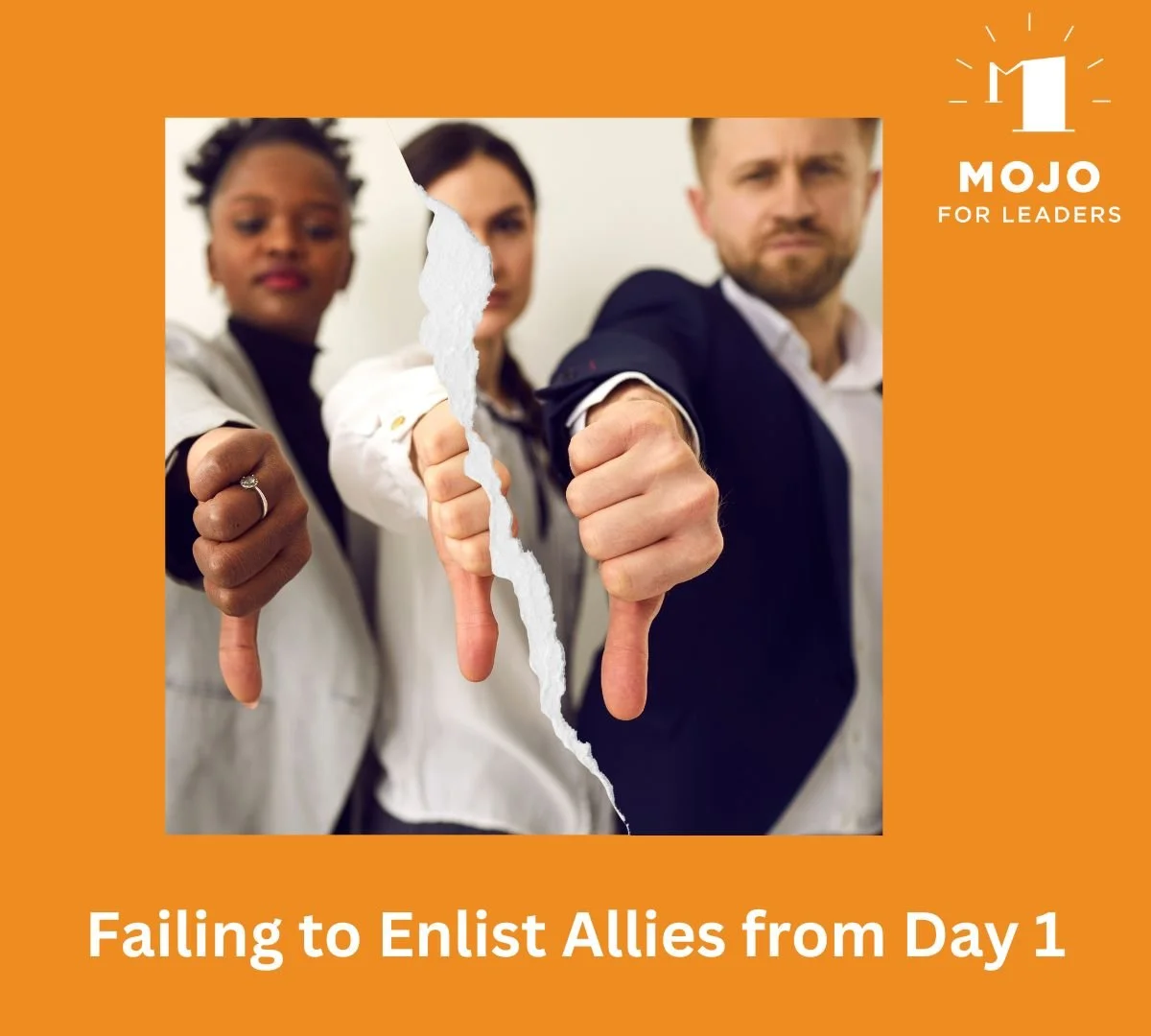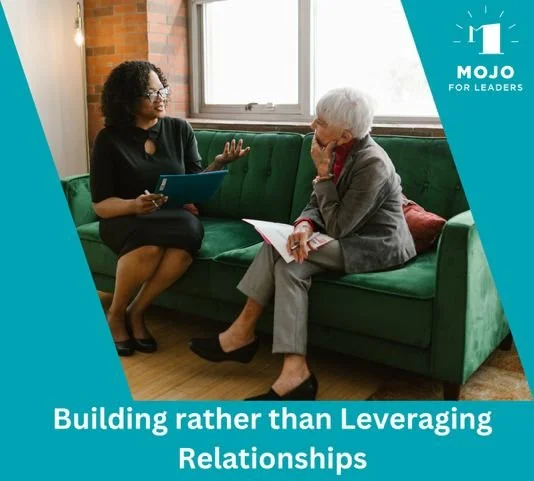
Minimising!
‘Minimising’ — *Marshall Goldsmith & Sally Helgesen identify this as the Number 9 challenge holding women back.
‘Minimising’, Goldsmith & Helgesen say, is rooted in an awareness of other people’s needs and the wish to show them that you value their presence and insights and manifests by downplaying your own achievements or qualifications.
Minimising can be connected to the 'Disease to Please' too - or rather, the avoidance of displeasing others.
We think ‘minimising’ may also be rooted in childhood socialisation of women around being seen, not heard, and an inner ‘smalling’ of oneself – almost ‘I don’t really belong’, ‘Maybe I can stay if I keep myself small and offer opinions tentatively .’
So, what does minimising look like?

The Disease to Please
According to Helgesen & Goldsmith, this “disease” stems from an unselfish passion for making others happy. But there’s a lot going on here.
Socialisation plays a big role — girls are still largely taught to be nice and helpful. No wonder it feels ‘natural’ to us! Educational and workplace streaming often sees women in helping, less valued roles, while fields like engineering, IT, and commercial development remain male-dominated.
Informal roles — organising meetings, taking minutes, mentoring, welcoming new staff — are often taken on by women, or simply expected of them. While some of this is shifting, research shows the trend persists.

The Perfection Trap
A participant in one of our early SOAR Leadership Programmes gave us a fantastic insight as she contrasted how her sons and daughters are taught in school and how we instil values in our children:
‘We teach our boys to be tough and our girls to be good’
There is an element of perfectionism that’s socialised into girls and women from our earliest ages. This is changing. For example, it’s fantastic to see much more female sport participation – learning resilience, experiencing winning and losing, camaraderie, and teamwork as well as physical fitness.
However, …..

Putting Your Job Before Your Career
This one can be a biggie.
We can be so busy proving our competence that we can become indispensable!
The death knell of our careers?
We need to constantly zoom in and zoom out around our careers.
Zoom in: Are we adding value and optimising our development and our contribution in our current role?
Zoom out: Are we seeing the bigger picture of our career progression and are we taking care of that too?

Failing to Enlist Allies from Day One
Firstly, you can enlist allies at any stage in your career – so many of us did not know about enlisting allies back on 'Day One'!
So, whether 'Day One' or 'Today', how do we go about enlisting allies?

Building rather than leveraging relationships
Here’s the pattern we’re talking about:
We build wonderful, trust-filled relationships.
We nurture and take care of them.
And we never, ever, leverage these relationships – somehow it feels like ‘using’ or ‘taking

Over-valuing Expertise
This one we see all the time – especially when women take up new roles!
Even though expertise is important, we know that there’s extra pressure on women to ‘prove ourselves’ when we take up new roles – especially in new organisations – in fact Catalyst Longitudinal Research has shown that women do better staying with an organisation where they’ve already proven their worth as a lot of moving can mean a lot of proving… we can end up giving as much as a whole year proving ourselves in a new organisation before our expertise is accepted and taken for granted.
All that said, our point here is that, even though women can be somewhat ‘forced’ into putting emphasis on proving their expertise when taking up new roles, we think this is not the best option.

Expecting Others to Spontaneously Notice and Reward Your Contributions
In our experience the root of this factor may lie in our attitude to organisational politics!
There are all sorts of words and expressions we use for those we see constantly telling the key people in our organisations how wonderful they are!
And we’re above that, aren’t we?
Our quality work should be seen, judged on facts, logic, analysis, creativity, innovation - and recognised as such. We shouldn’t have to go around telling people what our successes are. The work should stand in its own right.
Well, perhaps - and perhaps not….

Reluctance to Claim Credit
It’s so easy to say ‘take credit for achievements’ - The question is ‘How?’
And are we not claiming credit already??
We think some of the problem rests with language.
Are we, women especially, socialised to use ‘we’ over’ ‘I’ ?
We often hear ‘There’s no ‘I’ in TEAM’. This is a twee expression that sounds wise but it’s way off the mark – there are as many ‘I’s in a team as there are team members!

There’s Strength in Our Weak Ties!
We all know about the importance of building strong relationships in our personal and professional lives but how many of us appreciate the importance of developing ‘Weak Ties’? Sociologist, Mark Granovetter, developed a fascinating theory around the Strength of Weak Ties: his research revealed that Weak Ties—those casual connections and loose acquaintances we have—are surprisingly powerful. Here’s why: Our Strong Ties are likely to be people we know very well, people we trust, people who think like we do and share our values and interests, people we collaborate with – and, often, they’re people very like ourselves!

Building Trust - A Leader’s Essential Ingredient
“Trust is the glue of life. It’s the most essential ingredient in effective communication. It’s the foundational principle that holds all relationships. When the trust account is high, communication is easy, instant, and effective.” – Stephen Covey Building trust as a leader is crucial for effective communication, collaboration, and overall team success. Let’s explore some key principles and strategies for fostering trust in your leadership role. The Importance of Trust Trust serves as the bedrock for healthy working relationships. When team members trust their leader, they are more likely to cooperate, share information, and work effectively togethe

Appreciative Inquiry: A Positive Approach to Change and Leadership that Works With instead of On Your People
In today’s fast-paced business world, organisations are constantly seeking ways to improve their processes, enhance employee engagement, and drive positive change. The methodology that underpins our work in Mojo For Leaders is Appreciative Inquiry (AI). Developed by David Cooperrider in the 1980s, AI focuses on identifying and amplifying the strengths of individuals, teams, and organisations rather than dwelling on weaknesses. What is Appreciative Inquiry? It’s a collaborative and strengths-based approach to organisational development. Unlike traditional problem-solving methods, AI encourages organisations to focus on what is working well and build upon those successes.

Being Able to Ask Good Questions is Essential to Leading Effectively
In our work with leaders, we often share an image of a dense jungle with two speech bubbles rising up from it. One speech bubble says 'Hold on folks, we are in the wrong jungle!' and the other says 'Shut up! We are making progress!' How many times has this happened to us where we go full throttle after a solution, only to discover that we had not defined the problem, or asked the right question in the first place! Wise, carefully thought-out questions are worth their weight in gold.

Adult Mental Development - Your Infinite Potential for Growth
Today, we’re exploring the fascinating intersection of adult mental development and leadership, guided by the pioneering research of Robert Kegan. Understanding the principles of adult mental development can profoundly impact how we lead, learn, and grow in our professional lives. Adult mental development isn’t just about accumulating knowledge; it’s about transforming our understanding of ourselves and the world around us. Kegan’s research illuminates how adults progress through different stages of mental complexity, each with its own way of making sense of experiences.

Soft Front, Strong Back, Wild Heart; Your Recipe for Leading Authentically
In the ever-evolving landscape of leadership, we often find ourselves navigating complex challenges, balancing vulnerability with strength, and seeking authenticity. Enter the powerful mantra: “Soft Front, Strong Back, Wild Heart.” This phrase, coming originally from Joan Halifax and used by Brené Brown, Jerry Colonna, and others, encapsulates profound wisdom for leaders who aspire to lead with integrity and depth. The Metaphor Unveiled Here’s our take on each component as it applies to the leader’s journey: Soft Front: Imagine a leader with an open heart—a heart that listens, empathises, and connects.

From Overwhelm to Spaciousness - Leadership Tips for Finding Balance
5 Strategies to help to shift from Overwhelm to Spaciousness as Leader As leaders in today’s complex world, we often find ourselves caught in the whirlwind of responsibilities, deadlines, and high expectations. The relentless pace can lead to overwhelm, affecting our well-being and effectiveness. But fear not! In this blog, we’ll explore 5 practical strategies to navigate overwhelm by reflecting, connecting with and staying true to our leadership intention and values.

Discover the Secret to Awe-full Coaching!
AWE – ‘And What Else?’ – that magic little question, celebrated by Michael Bungay Stanier and used so often in coaching, gently nudges you to explore deeper, reach higher and dream bigger. It encourages you to unravel the intricacies of your thoughts, to confront what holds you back, and to envision the boundless possibilities that await you. It can invite you to dream and to experience that dream in all its glorious detail.

Innovate, Elevate, Celebrate: Marking International Coaching Week
Introduction Inspired by the International Coaching Federation’s (ICF) @internationalcoachingfederation theme of Innovate, Elevate, Celebrate, for International Coaching Week, May 13th – 19th, 2024, and our love of coaching, let’s explore how working with these transformative coaching themes propels leaders toward new levels of thinking, fulfilment, and delivery.

Get Your Mojo Working!! Accessing Your Personal Power as Leader
Let’s chat about something that’s a game-changer in the leadership world—your personal power. But we’re not just talking about any kind of power; we’re diving into the concept of Mojo, as defined by Marshall Goldsmith in his brilliant book ‘Mojo’. ‘Mojo is that positive spirit toward what you are doing now that starts from the inside and radiates to the outside.’ We love this definition that inspired us to name our business Mojo For Leaders. Why Mojo? When you’ve got your Mojo working, you’re firing from all cylinders.

Leaders, Will What Got You Here Get You There?
In the fast-paced world of business and leadership, it’s easy to get caught up in the idea that our past successes will continue to propel us forward. But what if we told you that what got you here won’t necessarily get you there? We find that many of our clients come to us when they hit the realisation that what they’re doing is no longer working for them.
We often assume that our past achievements are a reliable predictor of future success. After all, if we’ve climbed the corporate ladder or achieved a certain level of recognition, shouldn’t that trajectory continue indefinitely?
